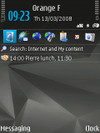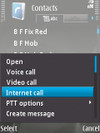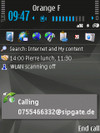![]()
Time for another Carnival of the Mobilits, this time hosted by Andrew Grill and again packed with all the latest people have written on wireless topics on their blogs in the past week. So don’t hesitate, head over and enjoy!
Category: Uncategorized
The Nokia N95 8GB: 18 Months Of ‘Naked-SIP’ Improvement
Back in 2006, I reported about my pretty modest VoIP over Wifi experience with the UTStarcom F1000G. At the time, I had four major issues which is why the phone went right back into the box and hasn’t left it since:
- Voice quality was bad.
- It would only work with some Wifi access points.
- Voice quality started to deteriorate quickly when moving away from the Wifi access point. Practical use of the phone was limited to a few meters around the access point.
- The software was not very stable and the device frequently lost the network and didn’t log back on.
Now, one and a half years later, I have picked up a Nokia N95 to replace my N93, mainly because the N93’s amount of memory can no longer handle the myriad of applications I use. There are many nice extras I have discovered since and one of the major ones is the integrated VoIP client. I have to admit that I was not expecting too much due to my prior experience. However, after testing it out I have to say I am very impressed!
The Good Things

As I am already using VoIP with Internet based VoIP provider SIPgate and a Siemens Gigaset DECT to IP phone, the SIP configuration wasn’t very difficult for me and SIPgate has a very detailed description on how to configure the N95. After exiting the configuration dialog the phone automatically establishes a Wifi connection and registers with the SIP server on the Internet. Once registration is successful, a little telephone receiver icon above a globe is shown on the right of the idle screen (see Figure 1).
Once the VoIP client is registered, the user has the choice to place a standard cellular call or the use the VoIP functionality whenever dialing a phone number or when selecting a contact from the address book. In both cases, the call is established over VoIP by selecting ‘Internet Call’ in the options menu instead of "Voice Call"(see Figure 2).

In terms of voice quality I am very impressed, it is the best I have experienced so far and I am not able to tell the difference between a VoIP and a cellular call to a fixed line phone. Very impressive! Also, the stability of the implementation is great. The longest call I have used the phone for so far was 90 minutes and I can not recall a single glitch during the time. The handset gets slightly warm over time but that is not really a problem.
Another nice and very important feature is that when you leave the coverage area of the Wifi access point and later come back, the SIP client detects that the Wifi network is available again and automatically re-connects to the SIP server. That’s great since I, and probably most other people , would be too lazy to manually restart the VoIP client when coming home. I have used the SIP client for about 2 weeks now and during that time I have extensively tested incoming and outgoing calls. Both work flawlessly and the N95 has now fully replaced my DECT phone. Also, Wifi sensitivity is a lot better compared to the N93 and especially to the F1000G. Voice quality is still excellent in neighboring rooms where both the N93 and the F1000G have given up before.

Being connected to the Wifi hotspot all day long must have some impact on the battery, or so I thought. In practice, however, it doesn’t seem to be much, the battery easily lasts a full day no matter whether the phone is connected to Wifi all day or not. Talk time is also acceptable. After a 90 minutes phone call, the battery was still about half full which is good enough for my purposes. Figure 3 on the left shows how a VoIP call is indicated to the user during the call establishment phase. The little "open lock" probably indicates that the call is not encrypted, which is the default with SIP. I tried activating security in the configuration but my SIP provider does not seem to support this on his voice gateway.
Some Things That Still Need Some Improvement
Nothing is perfect in this world so there are also few things in the N95’s SIP implementation which could be improved in the next software release. Since I am a bit of a traveler I split my time between Germany and France. In both places I have a Siemens Gigaset Access Point but with different software versions since France and Germany use different annexes of the ADSL standard. Strangely enough, the N95’s SIP client works great in Germany but always delays outgoing calls by exactly 30 seconds in France. After those 30 seconds everything works all right and voice quality is excellent. All that is different is the software version of the access point. I still can’t explain why this is happening but it is reproducible. It can’t be the DSL provider since my DECT to SIP phone works fine with the same SIP provider. Incoming calls work flawlessly.
Some minor details which could also be improved is the seamless integration with the rest of the phone functionality. A call received over Wifi can not be returned over the cellular network straight from the menu. Instead, the number has to be dialed manually or taken out of the address book. Also, the VoIP functionality is not yet fully integrated into the profiles functionality yet. I have a profile which only lets the phone ring when certain people call. This works well when I receive such calls via the cellular network. When I receive them over the Internet though, the calls are are only silently alerted when in this mode. Small details I can live with for the moment.
Summary
I think the N95 8GB shows very impressively where VoIP over Wifi is headed. In day to day use, VoIP calls don’t feel any different compared to standard cellular calls, while, of course, the Wifi coverage area is not left. Potentially, the VoIP client can also be used over a 3G connection but I haven’t tried that yet. Maturing VoIP integration in 3G handsets is also good news for LTE and WiMAX which both require some form of VoIP on mobile devices since there is no longer a circuit switched core network dedicated to voice calls. Nokia shows impressively that the software stack is ready.
Location: Another Diminishing Opportunity for Mobile Operators
Location based services have been the holy grail in mobile for at least half a decade now and I wonder what hasn’t been proposed to mobile operators over the past years from standardized Mobile Location Centers to A-GPS assistance their network could supply to mobile devices? Yet, they haven’t been able to figure out what to do with it, or more precisely how to monetize it, except for a applications such as location based pricing of voice calls, which do not require interaction with any equipment outside their own network.
When looking at current high end mobile devices from Nokia and others on the market, they all include GPS chips now and thus no longer require network operators for acquiring location information for them. The current generation of GPS chips require about 20 seconds to get a first position fix which is already good enough for many applications. With a server in the Internet that supplies the location of all GPS satellites to the GPS chip, this time is reduced to around 5 seconds, which is almost instantaneous from a user perspective. The only piece in the value chain the mobile operator is thus still required for is to connect the device to the server on the Internet.
According to a Sirf representative at the recent Mobile World Congress, the mobile only requests satellite position information from the network without sending any information such as a cell-id that could give away the approximate location of the device. Further according to Sirf, network based A-GPS assistance that sends satellite position information to a device could speed up the process to reach first time to fix times of less than a second. However, I think it is unlikely that mobile network operators will ever do this and a delay of around 5 seconds is short enough for a good user experience anyway.
So the room to maneuver for mobile operators in the location domain is getting small these days. But would it have made a difference if they’ve had another 5 years of time to work on this topic? Outside players on the other hand already put the emerging GPS capabilities to good use. Nokia Maps, Google Maps, etc. etc. have come from nowhere in the past 12 months and now offer positioning, car and pedestrian navigation, recommendation, finding point of interests, city guides, location dependent search, etc. etc.
Another holy grail, location based mobile advertising, however, is still a niche that offers lots of opportunities for network operators as network based location information is an important key. A company active in this space is Seekerwireless, and I leave you with a link to their site to explore further.
The Carnival of the Mobilists #114 is Online
![]()
Again, a busy week has passed like a whirlwind and it’s already time for a new edition of the Carnival of the Mobilists. This week, the Carnival is hosted by Chetan Sharma over at his AORTA blog (you have to love the name!). So for the best of the blogsphere of the past week on mobile, head over and enjoy!
Java and BREW
Every now and then I stumble over BREW, an API for third party applicatins on mobile phones. Since it seems to be mostly implementend in CDMA phones in the U.S., I haven’t come into personal contact with it and thus always wondered what the difference is to Java ME. After doing some research it looks to me like they have one thing in common: They both offer a cross device environment to programs. Apart from this, however, there don’t seem to be many similarities. BREW supports several programing languages including Java (but with a different API from Jave ME) and C++. While programs developed with Java ME can be distributed without the consent of the operator, BREW applications need to be certified and can only be distributed by the operator. So the business model for developers is quite different since they need to make a deal with each network operator they want to deploy their application with. In addition, network operators have no obligation to distribute a program, so developers and users are at the full mercy of the operator. To me that does not only look like a walled garden but more like a closed fortress. An environment with a future?
Vodafone To Trial Image Recognition Search
While waiting for the train this morning I read on Intomobile (sorry, can’t provide the link when moblogging) that Vodafone Germany will start an image recognition search trial in cooperation with news tabloid “Bild”. Readers can get more information on specially tagged articles (and maybe advertisments) by taking a picture and sending it to a Vodafone image recognition server. The server analyzes the picture and returns the requested information (I assume by MMS). That sounds very much like the technology from Barcelona based company DAEM Interactive. If that’s you, well done and lots of success! For the sake of the project I hope Vodafone thinks a bit about pricing before launching the project. The standard price of 39 euro cents for an MMS would be a major showstopper.
Opera Mini Statistics
Interesting numbers I’ve been given during the MWC in Barcelona last week: To date, the Opera Mini browser for mobile phones has been download 35 million times. Currently, the browser is downloaded 100.000 times a day! According to Opera, their Transcoding Servers for Opera Mini serves about 1.5 billion pages a month. They estimate that the total traffic going to their servers represents around 25% of the total Internet traffic of Norway, the home country of opera. Despite Norway only being a small country it says a lot about the quick evolution of accessing the web from mobile devices.
Opera Mini Should Have An Option to Disregard Mobile Optimized Pages
One should think that it’s a good thing if a web site has a mobile optimized version of their content. With Opera Mini, a mobile browser that compresses full web pages in a way that they can be nicely viewed on mobile phones, I have quickly discovered that this is not always the case. Here are take two examples:
- Amazon: While the mobile pages are loading a bit faster than Amazon’s full web pages the mobile version only contains a fraction of the information of the full page. When looking at an article I can not even browse the description. Sorry guys, that’s too limiting. I want to see the full page compressed by Opera Mini and not Amazon’s mobile version.
- Another example is Spiegel online, a German news magazine. Again, the mobile version, if reachable at all from Opera Mini only contains a fraction of the articles and pictures present on the full page. Again, I would very much prefer Opera to fetching the full web page and then compressing it.
I am not sure if Opera is actively requesting the ‘mobile’ versions of these web sites (I don’t even want to say ‘mobile optimized’ anymore) or if the web sites choose themselves to send the mobile optimized version based on the browser identity string. If so, Opera should make the request with a full web browser identity. Opera, any chance of adding a ‘mobile/full version’ selection feature in the next release?
The Carnival Of The Mobilists Blasts Off Again
![]()
This week the Carnival of the Mobilists is hosted by Taptu over at Taptology. Lots of stuff to find there around mobile application development and an avalanche started by Michael Mace, commented by many fellow blog writers. Haven’t seen so many individual blog responses on a blog post of someone for quite some time. Looks like Michael has struck a nerve 🙂 For this and more, head over to the Carnival and enjoy.
Puzzled About The Antenna Of An FM Transmitter In A Mobile Phone
The specs for the latest and greatest Nokia N78 lists a new feature which so far has only been available as an add-on for various products: An FM-transmitter to stream music and podcasts wirelessly to a Hifi set or the car stereo. What puzzles me is where they put the antenna inside the mobile or how it looks like!? At 100 MHz, the wavelength is around 300 cm. Even at a quarter of the wavelength the antenna still needs to have a length of 75 centimeters. How does that fit into a mobile phone? Can anyone shed some light on how this works in practice?